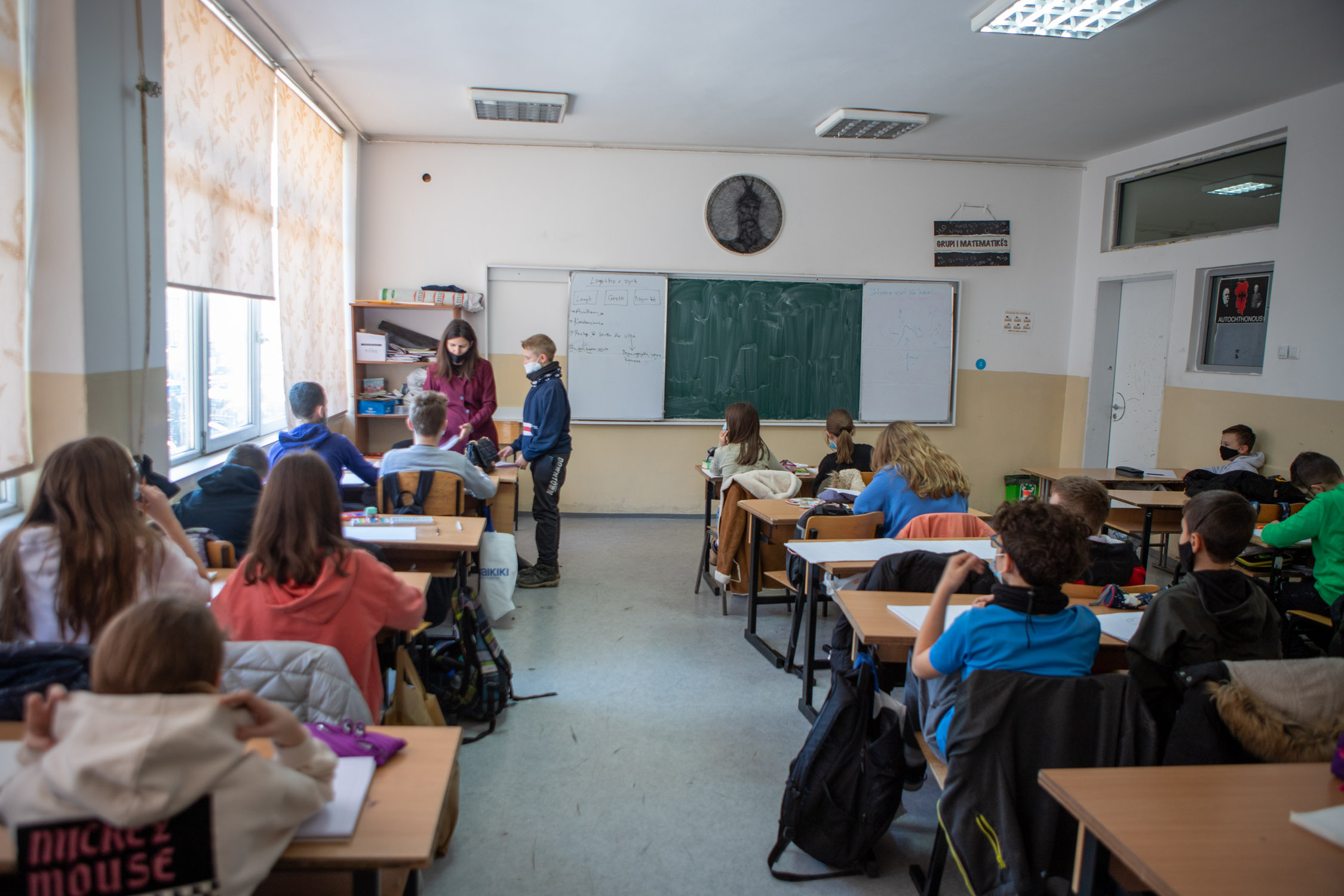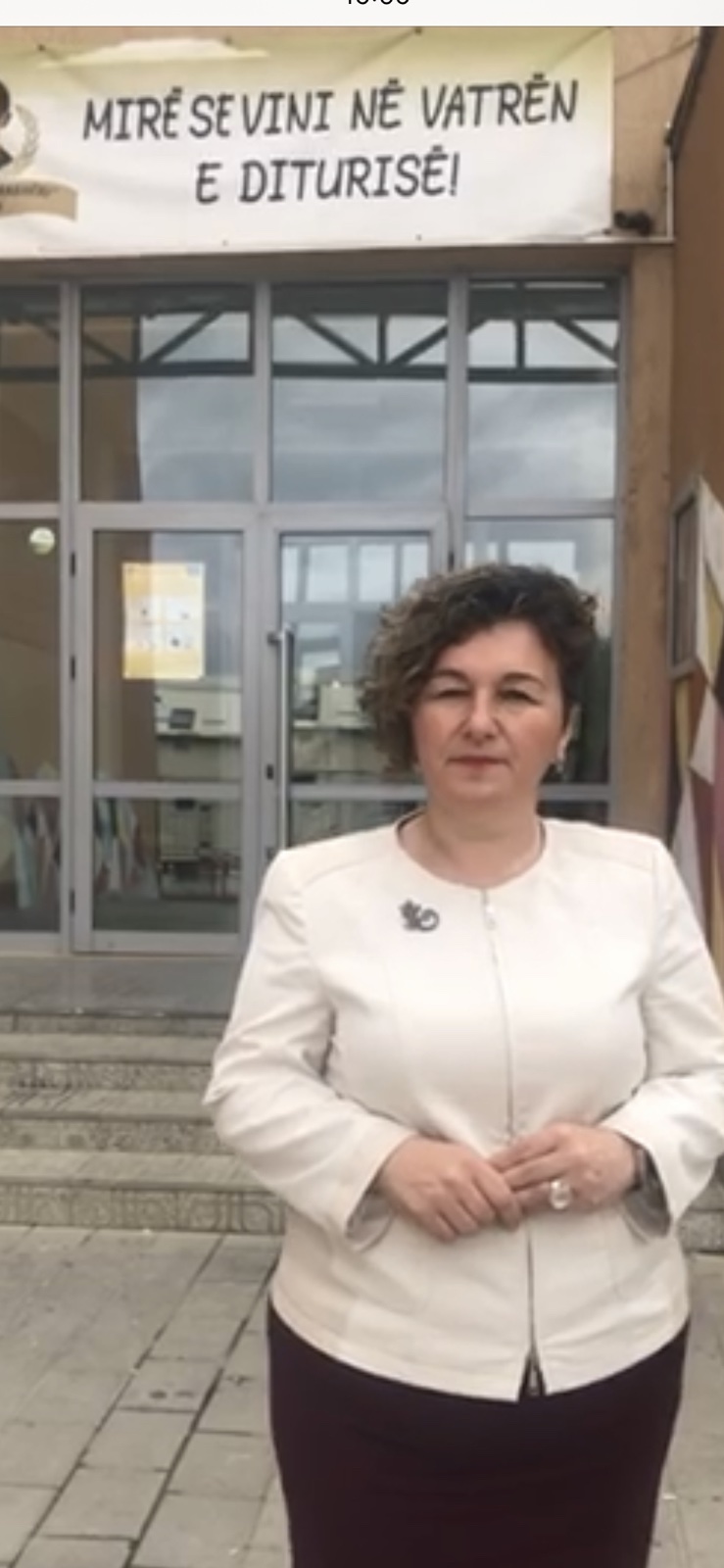
The Naim Frashëri primary and lower secondary school is one of the biggest in Pristina, the capital of Kosovo. The school has over 1,000 students and an area of around 5,000 square metres. Shqipe Vllasalija Mehmedi is the principal leading this huge organisation. One would expect that the major challenge she has experienced in her role would be linked to education but it turns out to be something quite different: “We had enormous problems during winter, and sometimes we had to miss classes because of problems related to the heating,” says Shqipe.
When she took over the school in 2018, the building was being heated by a central heating system fuelled by oil, which was delivered once a month. The delivery was organised for this and other schools by the municipal authorities. Shqipe explains that oil heating caused several problems including running out of fuel before the next delivery when temperatures were low, and serious harm to the environment around the school. “I remember back in 2018, teachers and students alike sitting with their coats on during classes, because there wasn’t enough heating,” says Shqipe.
“In an economic sense, Termokos has gained a lot since apart from reducing the losses in the network, it has gained 3,000 new customers, including public institutions such as two kindergartens, five schools, police stations, the Central University Hospital of Kosovo, and Kosovo’s National Theatre.”
Naim Bytyqi, Director of Distribution, Termokos
Increased heating quality and better environment protection
The heating and pollution problem in Pristina is not unique to Naim Frashëri School. For their heating, most Pristina residents use coal, or electricity from the nearby Kosovo A and B power plants, though some use the much more efficient heating from the Termokos district heating. This is generated by the steam that comes through pipes from the power plant. However, a considerable number of private and public buildings in Pristina, including Naim Frashëri primary school, were not connected to the district heating as Termokos had issues with their old and insufficient distribution system.
To help address this issue, in 2019 the EU Office in Kosovo launched a project to renovate the district heating network in Pristina. The purpose of the project was to enable the connection of new private and public customers to the district heating system and improve the heating supply for existing consumers. As a result of the project, over two years, 120 old substations have been renovated, 50 new ones have been installed and over seven kilometres of underground pipes have been replaced by new preinsulated pipes, resulting in increased efficiency and a significant reduction of losses of heat and water.
Naim Bytyqi, director of the distribution department and project manager on behalf of Termokos, says that the project has been a huge success. “In an economic sense, Termokos has gained a lot since apart from reducing the losses in the network, it has gained over 3,000 new customers, including public institutions such as two kindergartens, five schools, police stations, the Central University Hospital of Kosovo, and Kosovo’s National Theatre.”

“We are very grateful to the European Union as with their support we now have high quality heating, and students and teachers alike can fully focus on education in a pleasant and warm environment.”
Shqipe Vllasalija Mehmedi - school principal, Naim Frashëri Primary School
Pleasant and warm environment in school
But what is also very important according to Bytyqi is the fact that these new customers no longer need to use fossil fuels for heating. “Prior to being connected to the district heating network, all the public institutions used oil as a source of heating. As well as dealing with huge financial costs due to high oil prices, these institutions had been a source of pollution, especially problematic given that they mainly operate in the city centre. “Residential consumers now connected to the Termokos network, also no longer use electricity for heating purposes. This has a positive effect on household economy, it decreases the demand for electricity consumption and it improves air quality,” concludes Bytyqi.
Now, following the completion of the project, the Naim Frashëri school has 24-hour heating covering the whole school space including classrooms, corridors, and toilets. As the principal says: “We are very grateful to the European Union as, with their support, we now have high quality heating, and students and teachers alike can fully focus on education in a pleasant and warm environment.”
About the project
The Rehabilitation of the District Heating Network in Pristina project was finalised in April 2021 and was funded by the European Union under the Instrument for Pre-accession Assistance programme.
Photo credits: Arbër Gjoni
When she took over the school in 2018, the building was being heated by a central heating system fuelled by oil, which was delivered once a month. The delivery was organised for this and other schools by the municipal authorities. Shqipe explains that oil heating caused several problems including running out of fuel before the next delivery when temperatures were low, and serious harm to the environment around the school. “I remember back in 2018, teachers and students alike sitting with their coats on during classes, because there wasn’t enough heating,” says Shqipe.
Increased heating quality and better environment protection
The heating and pollution problem in Pristina is not unique to Naim Frashëri School. For their heating, most Pristina residents use coal, or electricity from the nearby Kosovo A and B power plants, though some use the much more efficient heating from the Termokos district heating. This is generated by the steam that comes through pipes from the power plant. However, a considerable number of private and public buildings in Pristina, including Naim Frashëri primary school, were not connected to the district heating as Termokos had issues with their old and insufficient distribution system.
To help address this issue, in 2019 the EU Office in Kosovo launched a project to renovate the district heating network in Pristina. The purpose of the project was to enable the connection of new private and public customers to the district heating system and improve the heating supply for existing consumers. As a result of the project, over two years, 120 old substations have been renovated, 50 new ones have been installed and over seven kilometres of underground pipes have been replaced by new preinsulated pipes, resulting in increased efficiency and a significant reduction of losses of heat and water.
Naim Bytyqi, director of the distribution department and project manager on behalf of Termokos, says that the project has been a huge success. “In an economic sense, Termokos has gained a lot since apart from reducing the losses in the network, it has gained over 3,000 new customers, including public institutions such as two kindergartens, five schools, police stations, the Central University Hospital of Kosovo, and Kosovo’s National Theatre.”

Pleasant and warm environment in school
But what is also very important according to Bytyqi is the fact that these new customers no longer need to use fossil fuels for heating. “Prior to being connected to the district heating network, all the public institutions used oil as a source of heating. As well as dealing with huge financial costs due to high oil prices, these institutions had been a source of pollution, especially problematic given that they mainly operate in the city centre. “Residential consumers now connected to the Termokos network, also no longer use electricity for heating purposes. This has a positive effect on household economy, it decreases the demand for electricity consumption and it improves air quality,” concludes Bytyqi.
Now, following the completion of the project, the Naim Frashëri school has 24-hour heating covering the whole school space including classrooms, corridors, and toilets. As the principal says: “We are very grateful to the European Union as, with their support, we now have high quality heating, and students and teachers alike can fully focus on education in a pleasant and warm environment.”
About the project
The Rehabilitation of the District Heating Network in Pristina project was finalised in April 2021 and was funded by the European Union under the Instrument for Pre-accession Assistance programme.
Photo credits: Arbër Gjoni
Please wait while your video is being uploaded...
Don't close this window!